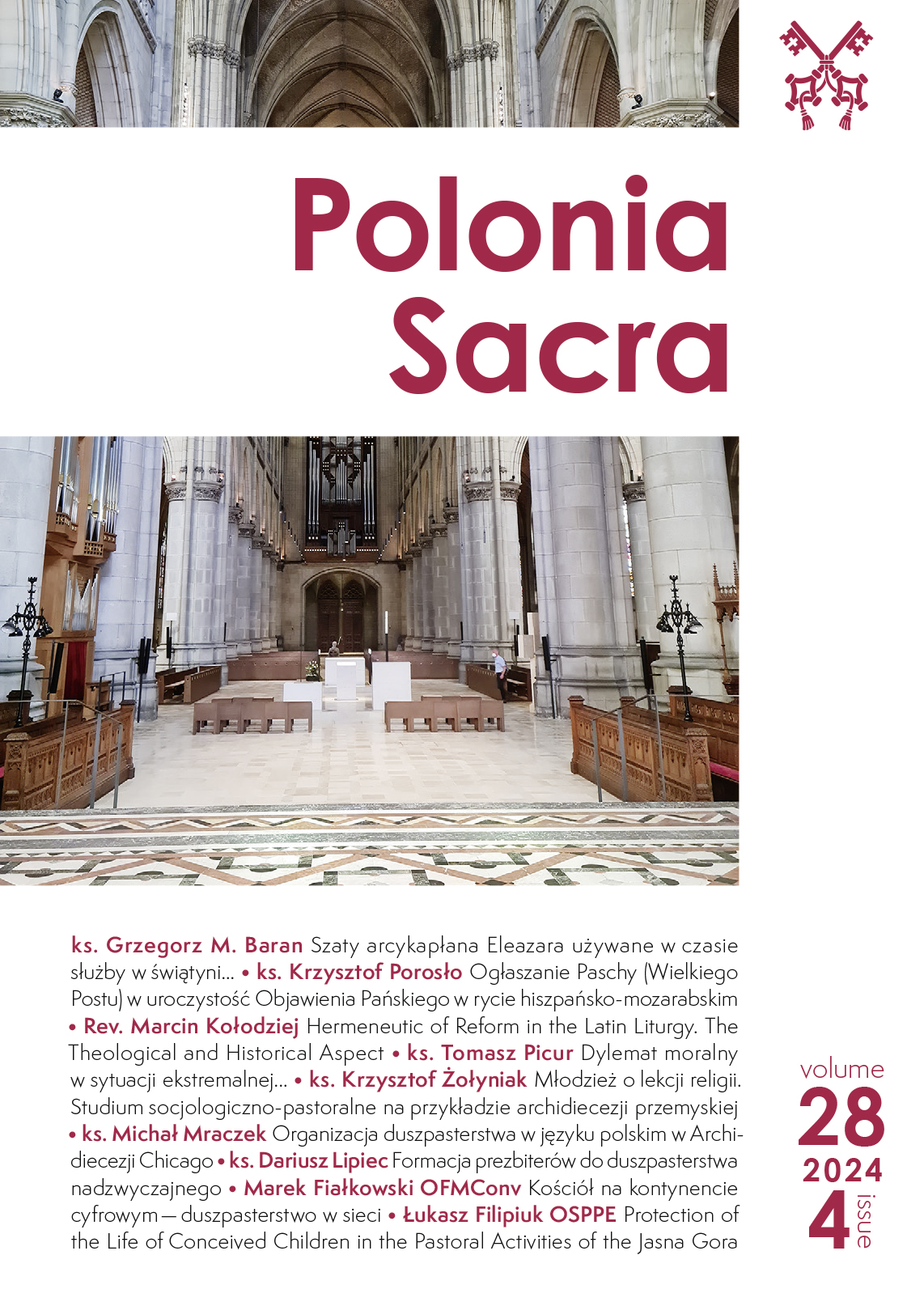Youth about Religion Lessons. Sociological and Pastoral Study on the Example of the Archdiocese of Przemyśl
DOI:
https://doi.org/10.15633/ps.28405Keywords:
youth, catechesis, religiosity, valuesAbstract
Knowledge about the factors influencing the resignation from participation in school religion classes and information allowing to assess the scale of this phenomenon from a sociological point of view are highly dispersed and poorly recognized, especially in relation to schools in the Archdiocese of Przemyśl. The study presents the results of a sociological study entitled “Youth about Religion Lessons. Sociological and Pastoral Study on the Example of the Archdiocese of Przemyśl” carried out by the author in the fall of 2021 among young people from the Archdiocese of Przemyśl. The author tries to answer the question of why high school students from the Archdiocese of Przemyśl give up religious lessons, analyzing the answers to questions about religious practices, the role that school catechesis plays in the lives of contemporary youth and the impact of catechesis on their life choices. The discussion of the issue described above has been structured as follows: introduction, goals and tasks of school religious education, in relation to the system of values and spiritual aspirations that are intended to inspire young people during school religion classes, discussion of own research and pastoral conclusions and postulates. The article uses analysis and synthesis and pastoral methods.
References
Baniak J., Katecheza szkolna w opiniach i ocenach młodzieży i rodziców, „Poznańskie Studia Teologiczne” 9 (2000), s. 237–259.
Barabas M., Autorytety w życiu współczesnej młodzieży, „Edukacja — Technika — Informatyka” (2019) nr 3 (29), s. 15–20, https://doi.org/10.15584/eti.2019.3.1.
Buta J., Nastolatek jako adresat przekazu treści wiary na lekcji religii w szkole ponadpodstawowej, „Studia Włocławskie” 21 (2019), s. 293–312.
Centrum Badania Opinii Publicznej, Dlaczego Polacy odchodzą od Kościoła?, oprac. M. Grabowska, Warszawa 2022 (Komunikat z Badań, 105).
Fiałkowski M., Działalność zbawcza rodziny w środowisku lokalnym, w: Duszpasterstwo rodzin w parafii, red. J. Goleń, D. Lipiec, Lublin 2016, s. 153–167.
Filipiak A., Między katechezą a religioznawstwem. W poszukiwaniu uzasadnienia dla nauczania religii w szkole, „Katecheta” 3 (2015), s. 89–92.
Gwiazda M., Religia w szkole — uczestnictwo i ocena, w: Młodzież 2021. Raport z badań ilościowych zrealizowanych przez Fundację CBOS, Warszawa 2022, s. 141–149.
Jan Paweł II, Adhortacja apostolska o katechizacji w naszych czasach Catechesi tradendae, 16.10.1979.
Konferencja Episkopatu Polski, Dyrektorium katechetyczne Kościoła katolickiego w Polsce, Warszawa 2001.
Kongregacja ds. Duchowieństwa, Dyrektorium ogólne o katechizacji, Poznań 1998.
Łabendowicz S., Katecheza w szkole — 25-lecie, „Zeszyty Formacji Katechetów” 59 (2015) nr 3, s. 101–111.
Misiaszek K., Włoski model nauczania religii katolickiej, „Studia Katechetyczne” 7 (2010), s. 58–79.
Obuchowska I., Adolescencja, w: Psychologia rozwoju człowieka, t. 2, red. B. Harwas-Napierała, J. Trempała, Warszawa 2000, s. 163–197.
Oleszkowicz A., Przebieg kryzysu adolescencyjnego w aspekcie przezwyciężania niezgodności między celami a możliwościami jednostki, red. A. Oleszkowicz, Wrocław 1993, s. 7–21 (Prace Psychologiczne, 35).
Osial W., Misja wychowawcza lekcji religii w szkole, „Warszawskie Studia Teologiczne” 25 (2012) nr 2, s. 269–280.
Panuś T., Katecheza jako szansa formowania współczesnej młodzieży, „Polonia Sacra” 20 (2016) nr 4, s. 25–40, https://doi.org/10.15633/ps.1925.
Paweł VI, Deklaracja o wychowaniu chrześcijańskim Gravissimum educationis, 28.10.1965.
Sobór Watykański II, Konstytucja duszpasterska o Kościele w świecie współczesnym Gaudium et spes, 07.12.1965.
Papieska Rada ds. Krzewienia Nowej Ewangelizacji, Dyrektorium o katechizacji, Kielce 2020.
Pilch T., Zasady badań pedagogicznych, Warszawa 1995.
Pilch T., Bauman T., Zasady badań pedagogicznych. Strategie ilościowe i jakościowe, Warszawa 2001.
Szwajkajzer A., Młodzież o lekcjach religii w szkole, w: Szkoła czy parafia? Nauka religii w szkole w świetle badań socjologicznych, red. K. Kiciński, K. Koseła, W. Pawlik, Kraków 1995, s. 141–160.
Twardzicki B., Katechetyka formalna w służbie wiary, Przemyśl 2001.
Wichrowski J., Wpływ osobistych doświadczeń religijnych na religijność młodzieży w wieku 17–20 lat na podstawie badań psychologiczno-pastoralnych, Płock–Warszawa 1995, niepublikowana praca magisterska.
Włosiński M., Szkolna katecheza w procesie kształcenia i wychowania ucznia w szkole na tle projektu reformy systemu edukacji, „Katecheta” 9 (1998), s. 27–32.
Zellma A., Czupryński W., Korelacja nauczania religii z katechezą parafialną we współczesnym dyskursie polskich katechetyków, „Teologia i Człowiek” 49 (2020) nr 1, s. 87–107, https://doi.org/10.12775/TiCz.2020.005.
Zubrzycka-Maciąg T., Goliszek P., The personal aspect of the moral and axiological upbringing of children and adolescents, „Lubelski Rocznik Pedagogiczny” 39 (2020) nr 2, s. 23–37, https://doi.org/10.17951/lrp.2020.39.2.23-37.
Religia w szkole — najnowsze dane samorządowe i kościelne, https://www.ekai.pl/religia-w-szkole-najnowsze-dane-samorzadowe-i-koscielne/ (15.02.2024).
W dziesięciolecie powrotu katechezy do szkół. Z listu pasterskiego Episkopatu Polski na rozpoczęcie roku szkolnego 2000/2001, http://nowezycie.archidiecezja.wroc.pl/numery/102000/powrot.html (15.02.2024).
Downloads
Published
Issue
Section
License
Copyright (c) 2024 Krzysztof Żołyniak

This work is licensed under a Creative Commons Attribution 4.0 International License.
Authors who publish in this journal agree to the following terms:
- Authors retain the copyright and full publishing rights without restrictions and grant the journal right of first publication with the work simultaneously licensed under a Creative Commons Attribution 4.0 International License that allows others to share the work with an acknowledgement of the work's authorship and initial publication in this journal.
- Authors are able to enter into separate, additional contractual arrangements for the non-exclusive distribution of the journal's published version of the work (e.g., post it to an institutional repository or publish it in a book), with an acknowledgement of its initial publication in this journal.
- Authors are permitted and encouraged to post their work online (e.g., in institutional repositories or on their website) prior to and during the submission process, as this can lead to productive exchanges, as well as earlier and greater citation of published work (See The Effect of Open Access).

